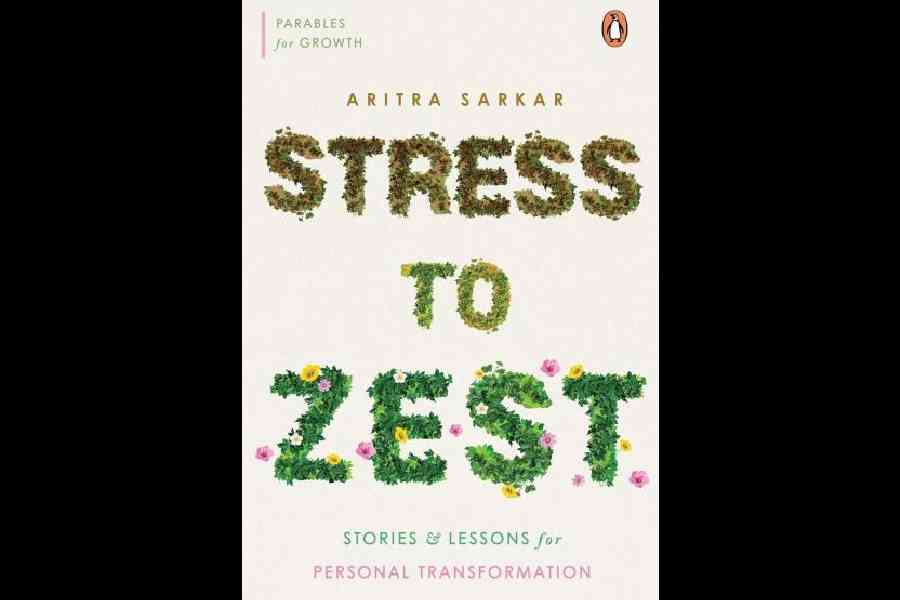WHAT IS STRESS?
Almost everyone juggles multiple priorities in life. Family, career, education, finances, health, grooming... the list of tasks is endless. In every sphere, we spend lots of time and energy trying to satisfy the needs and expectations of others. On the other hand, we seldom reflect on the question, ‘Who do I want to be?’ This central question of our existence — the purpose of life — gets relegated to the backwaters of our consciousness amid the noise and hustle of daily life. The absence of purpose can result in low self-esteem, make us susceptible to the diktats, control, or influence of others, erode our sense of autonomy, and lead us down the dank alleyway of harmful behaviour. If this happens, various negative feelings may creep into our minds, causing unhappiness.
Stress is a debilitating swirl of negative feelings — frustration, anxiety, depression and anger — induced by our compulsion to meet expectations. These expectations may be our own creations, or they may be foisted onto us by others. Stress that stems from trying to meet internal expectations is called ‘inner stress’; while that which arises when we attempt to satisfy the demands of others is called ‘external stress’.
Inner stress is the negativity that fills our hearts and minds when we feel unable to meet our own expectations regarding our performance, growth, or ownership. This form of stress is self-induced. Its origin lies in our mental conditioning. Most of us grew up believing that it’s better to follow a path charted by others instead of carving out our own. Thus, we’ve become used to letting the words and deeds of others define our thinking and actions. Consequently, we never develop the self-confidence required to shape our own identity, nor to set our own benchmarks for happiness. Instead, we adopt goalposts from society, without thinking about whether or not they are right for us. Many of us are paying a steep price for our uncritical submission to the demon of dependency. Dissatisfied with the state of affairs in our life relative to our expectations, we are often so racked with anxiety, gloom and disappointment, that we find it hard to approach the future with an optimistic mindset. Four aspects of life that often give rise to inner stress are relationships, jobs, finances and health.
External stress is the negativity we experience when we try to meet the expectations of others. Unlike inner stress, this form of pressure is directly applied by people who frequently coerce us into accepting their demands and want us to meet their expectations. These may include our peers, family members, bosses and various other influential figures in society. From their perches, these individuals use their powers to impose a set of standards and expectations upon us, causing strife by forcing our lives to veer off in a direction away from our hearts. The most common external stresses are social, parental, and competitional stress.
Both forms of stress can be devastating to our well-being. However, they tend to manifest themselves differently. The difference between how inner stress and external stress affect us is explained with metaphors below.
Inner Stress
Imagine yourself about to run on a treadmill. You’ve preset it to roll at a specific pace and incline, but these settings can’t be changed as long as the machine is in motion. Moreover, the duration of the run has been preprogrammed by the manufacturer and you can’t see the timer. You’ve listened to numerous people who’ve all said that the only way to improve your speed and stamina is to run on that particular treadmill, at a certain pace and intensity. These opinions tend to override one’s own instinct. ‘What do I know about improving my well-being?’ you ask. ‘Being experts, these folks must be right,’ you think. ‘That thing sure looks unpleasant, but I’m unaware of a better option to improve my fitness,’ you deliberate. Ultimately, you ignore your own opinions on treadmill running and decide to get on the machine. Following the advice of others, you then calibrate the settings to make your run uncomfortable and challenging.
Now picture yourself running in these circumstances. After some time, you’ll surely feel exhausted. Your body will cry, ‘Please stop!’ But you’ll find it hard to do that because you’ll be worried about squandering the progress you’ve already made. At some stage, your mind will scream, ‘That’s enough!’ You’ll realize you’ve pushed yourself hard to pursue an activity you really don’t care about. Fatigue will overcome you and leave you gasping for breath.
You’ll feel jaded. You’ll feel listless and in pain. These feelings will only intensify as you run for longer and longer, with no end in sight. You’ll want to jump off that treadmill. But now you’ll worry that by stepping off, you might end up letting everyone down. Anxiety and confusion will cloud your mind and make it impossible to act in your own best interest. Congratulations, you’ve set yourself up for a lifetime of misery!
External Stress
Now let’s look at an example of how the pressure of external stress ruins one’s mental well-being.
Imagine yourself running a 100-metre race against an army of faceless runners. Before you can say ‘Usain!’ the contest is over. Irrespective of the result, a gang of officials drags you to the starting line of another race as soon as you finish the first. There, you see another crop of faceless souls lined up next to you, keen to bag the next gold medal. In a jiffy, this one’s over too. After that, you’re dragged to another race... then another... and another... in perpetuity. Before you know it, you’ve got leaden feet! How would you feel enduring through the unending races?
As you run a series of races (whose results are preordained) against a continuously changing pantheon of competitors, you will feel anxiety. As you compete in a race over which you have no control or influence, you will feel frustrated. Weighed down by the cumulative force of all that mental negativity, you will tell yourself in resignation, ‘I either have to put up with the system or quit the stadium altogether!’
That’s external stress for you. Stress is the toxic by-product of the modern, mechanical life. It’s the life we’ve embraced — abandoning our true calling in order to ensure certainty of income and a certain standard of living. By letting these strains into our system and giving them free rein to pollute our hearts and minds, we run the risk of turning into emaciated husks.
Aritra Sarkar is the author of Goliath of Shenzhen (2016), and the audio drama Stilettos and Dentistry. His short stories have appeared in esteemed literary magazines and anthologies. He is a founding member of the Calcutta-based spiritual foundation Oneness










